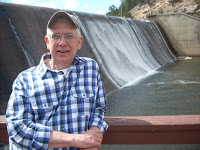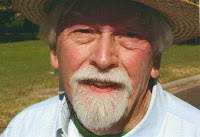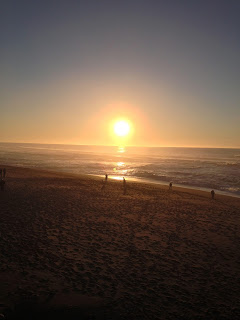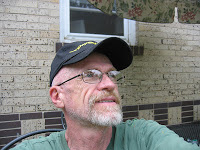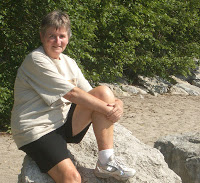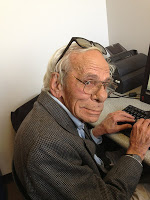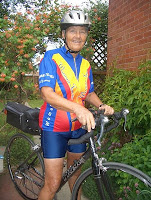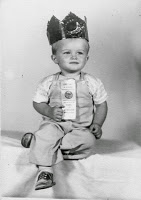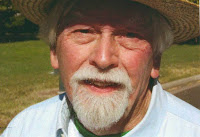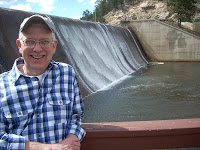I once served as a Deputy Sheriff in Pima County (Tucson)
Arizona for just short of 4-years. At
one time Pima County extended all the way south to the Mexican border during
the time that Wyatt Earp was a lawman in that part of the county. So, he and I were both deputies in Pima
County. I resigned returning to college
and pursuing a BS degree in Law Enforcement but the school, BYU, changed the
focus of the course so I graduated with a BS in Justice Administration. During my time in Tucson, I was stationed 24
miles north in the Marana Substation and also served about 9-months in the
vehicle maintenance section coordinating vehicle repairs and routine
maintenance.
In those years I went to 3 fatal traffic accidents;
apprehended two armed robbers—recovering $10,000 in stolen money from a drug
rip-off; convinced a local “runaway” to return home voluntarily; recovered one
stolen car driven by 5 escapees from a Texas Sheriff’s youth farm/ranch—the
oldest being only 12; detained for ICE numerous undocumented aliens; eliminated
one very potential neighborhood “feud” between a 12 yr old boy and an out of
patience new neighbor; arrested four California men who came to Tucson to buy
bricks of marijuana and who had an illegal sawed off shotgun; tracked burglars
through the dessert; became a scoutmaster for the church troop; wrote over 200
traffic tickets; arrested 30 drunk drivers—one of which was a priest (I later
learned the local “retreat” was one where the church sent its pedophile priests
for rehab); did not arrest one drunk
driver because he was only 20 feet from his driveway; got propositioned by a
waitress; got propositioned by the CIA; recovered a stolen purse at a high
school football game—referring one 6th grade repentant boy to his father
and one unrepentant boy to the system via a “paper referral” and released him
to his father; was the only lawman in 500 square miles during midnight shifts;
in an act of revenge, I collected enough “dirt” on one of my supervisors that
he was transferred back to Tucson and decided to resign instead—2-years short
of retirement; and saving the best for last, I got married. Working in Marana was exactly like being a
Wild West deputy except I drove a car instead of riding a horse. I loved the work.
When I resigned to return to college, I was in the process
of collecting signatures to run for the local Justice of the Peace. Although I had more than enough signatures,
when BYU called and said there was an opening in married student housing,
Deborah and I decided to return so I could finish my degree. She had to quit her medical technologist
position so we could go. Shortly after
arriving and starting classes, I remembered why I really didn’t like
school. I also joined Air Force ROTC so
ended up on active duty once again when I graduated.
My first assignment as an officer was to the security
police squadron at Malmstrom AFB, Montana as a Shift Commander for the on-base
law enforcement and base security flights.
The base security flight primarily guarded the nuclear weapons storage
area. I spent two-years in that position
and then was assigned as a Flight Security Officer for the flights providing
security response in the off-base missile field. My flight and I would be away from the base
for 3 ½ days at a time. I participated
in a few incidents but the one experience I really want to tell you all about
occurred after I arrived at my next base in Jacksonville, Arkansas circa 1984.
Little Rock AFB was home to a missile wing supporting the
liquid fueled Titan II ICBM. In
September 1980 prior to my arrival (1983), one nuclear tipped missile exploded
in its silo. This is the story of what
happened before, during, and after the incident. This information is not classified so I won’t
have to kill any of you after you’re done reading it.
Whenever a nuclear warhead is present, Air Force
regulations require that at least two people must be present in such proximity
to each other that each can monitor the actions of the other—absolutely no
exceptions or violations are tolerated.
The Titan II is a two-stage rocket.
To save weight, parts of the very thin outer skin of the rocket are
actually part of the fuel tanks. The
fuel is of two types—an oxidizer and the fuel.
Both are hypergolic, meaning that when the two chemicals touch, they
instantly ignite. The fuel and oxidizer
tanks are so thin that the rocket will collapse in upon itself if the liquid
fuels are removed improperly as the fuel keeps the tanks from being able to
collapse. The skin is so thin that
hand-held maintenance tools to be used on the missile or its components have
lanyards permanently attached to prevent the tool (sockets, wrenches, etc.)
from falling between the rocket and the maintenance platforms surrounding it
and puncturing the skin.
So, one day all the counts, accounts, no accounts, and
recounts (oh wait that’s different story).
One fateful day, two maintenance technicians were in the silo performing
maintenance on a component internal to the missile. One of the men needed a tool that he forgot
to bring down with him. He knew that a
tool box (with tools to be used elsewhere in the underground launch complex
outside of the silo) was located in the tunnel towards the launch control
capsule. These tools did not have
lanyards attached. Being stupid,
careless, or just plain lazy, he left his partner alone with the missile (major
violation #1 and also stupid decision #1) and went to get the unauthorized tool
rather than having them both go topside and return with the authorized tool
(stupid decision #2).
The tool needed was a socket for a socket wrench. While using the socket, it slipped off the
wrench and because it did not have a lanyard, the socket fell between the
missile and the maintenance platform around the missile (Murphy’s Law in
action). Can you guess what happened
right after the “Oh shit” expletive? You
guessed it. The socket fell three or
more levels gaining momentum before hitting the edge of a platform below and
bouncing into the side of the missile puncturing a fuel tank. Instantly, red fuming nitric oxide began to
leak setting off the chemical vapor sensors which triggered the alarm. The launch crew ordered the silo evacuated
and notified the base of the problem (good decision #1).
The deputy wing commander responded with the emergency
response teams. Upon arrival, two
environmentally suited fuel personnel went down to the silo to inspect the
damage. Upon their report the base contacted
the Martin-Murrieta company (the builder of the Titan II) to get their
input. After a short period of time,
Martin-Murrieta replied: 1st you can’t do anything to stop the leak;
and 2nd the missile will explode in approximately 8 ½ hours your
local time today. Periodically, the two
fuel personnel were sent down to check on the progress of the leak (dangerous
or even stupid decision #3). (No
civilian or even some military members routinely accuse local commanders of
using their brains. Yes, I am biased.) At one time, they even ordered the 740-ton
silo cover door be opened so that the explosion would not be contained within
the silo. Instantly the highly toxic red
vapor left the silo and a large red “cloud” began to drift towards highly
populated centers, so the cover was closed (good decision #2).
An order was given to send one man back down to check on
the missile (the launch capsule had been evacuated by this time) (major
violation #2 & stupid decision #3).
As
the 8 ½ hour time limit approached, two environmentally suited personnel were
ordered down to check on the missile (stupid decision #4 and also fatal). As the expected explosion time arrived, the
two suited personnel were on their way back.
The first one had cleared the stairwell coming up completely above
ground. The second one was still half
underground when the missile exploded.
The first man was blown across the complex into the chain link fence
where the fence fabric cushioned his impact.
The second man was “cut in half” at the waist by the force of the
blast. The debris from the incident was
stored in an above ground maintenance shed at one of the remaining missile
complex sites. I had the pass-key and I
actually saw the remaining parts of the destroyed missile and the bloody
environmental suit of the airman who died.
Here
is the sequence of events at the time of the explosion. The fuel finally leaked out enough that the
missile began to collapse. As it
collapsed the other 1st stage fuel tank ruptured, the two chemicals
touched and instantly exploded; the pressure lifted the 740-ton silo cover door
off its foundation rails; the blast spread out circular injuring the two
airman; that blast caused the 2nd stage fuel tanks to rupture and
they also added to the explosion which accomplished five things; 1st
the 740-ton door was lifted quite high; 2nd the nuclear warhead was
blasted like a bullet into the bottom of the 740-ton door breaking it into two
pieces one being 1/3rd the size of the original; 3rd the
larger piece flew about 30 yards and then flattened the Air Force pickup truck
that the deputy wing or base commander had been sitting in just 30-seconds
earlier; 4th the smaller piece landed about 100 yards away; and 5th
the warhead was nowhere to be found (major violation #3—a lost and unguarded
nuclear bomb—heads will roll).
The
rest of the night, military radio traffic was filled with the euphemisms “has
it been found” and “where is it”. The
bomb was found the following morning during daylight hours. One of the perimeter security guards was
actually sitting on it all night. He
never reported finding it because he didn’t know what it was.
EPILOG
1.
All security police personnel were shown a
dummy warhead during their initial orientation upon arrival at the base (it
looks like a large milk can of the type used on family dairy farms);
2.
The two environmentally suited airmen were
given medals (one posthumously);
3.
The surviving suited airman was given a
Letter of Reprimand because he was the one who went down alone to check on the
missile even though he was following orders—he was supposed to refuse to obey
as it was an illegal order; and
4.
Nuclear bombs are designed to be
“three-point safe”. This means that they
will not yield a nuclear explosion if burned, receive a high impact, or hit by
a stray electrical charge. The design
could never be thoroughly tested. Anecdote: When the person who created the three-point
safe design was told that the bomb was found with a large dent (from impacting
the 740-ton door) having survived the explosion, he was heard to say, “I TOLD
them it would work!”
5.
In 1984, I became the project officer for
the installation, planning the procedures for use, and personnel training for a
DES confidential real-time usage encrypted radio system.
I know this is the true story because I read parts of the
official investigation report and reviewed the numerous photographs. One photograph sticks in my mind. It is an overhead shot of the silo taken via
helicopter. The silo opening is dead
center and surrounding it are compression circles. It strongly reminds me of a dart board or
even a target.
Do any of you remember hearing or reading about this event?
I was in the Air Force as a Missile Security
Officer in 1980 stationed in Montana; I never heard of it.
For other versions of the explosion go
to:
The public versions are different than
the official investigative report I read. (Nothing new about that is there?)
What did a Titan Launch Complex look
like? Go to:
© 31 Mar 2012
About the Author
I was born in June of 1948 in Los Angeles, living first in Lawndale
and then in Redondo Beach. Just prior to
turning 8 years old in 1956, I was sent to live with my grandparents on their
farm in Isanti County, Minnesota for two years during which time my parents
divorced.
When united with my mother and stepfather two years later
in 1958, I lived first at Emerald Bay and then at South Lake Tahoe, California,
graduating from South Tahoe High School in 1966. After three tours of duty with the Air Force,
I moved to Denver, Colorado where I lived with my wife and four children until
her passing away from complications of breast cancer four days after the 9-11-2001
terrorist attack.
I came out as a gay man in the summer of 2010. I find writing these memories to be
therapeutic.
My story blog is: TheTahoeBoy.Blogspot.com
